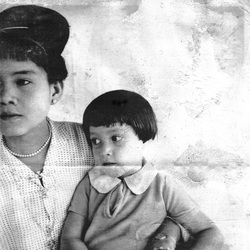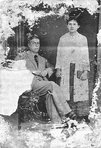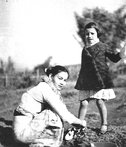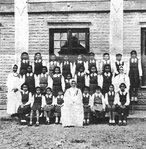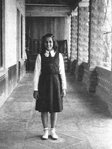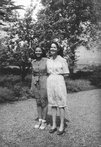Sentry Page Protection
Please Wait...
Voyage round my mother
by
Kathleen Baird-Murray
|
Khyin Nyun and Maureen as a child, Kathleen's grandmother and mother.
It was not until she was a teenager that Kathleen Baird-Murray
began to ask questions about her Burmese ancestry. Here she describes the journey that she and her own children took to Burma, taking her mother’s autobiography (A World Overturned, A Burmese Childhood 1933-1947 by Maureen Baird-Murray, (A remarkable story of life in the St Agnes Convent, Kalaw, during WWII) with them as their guidebook, in order to piece together the family story. |
|
We meet on the roadside, my uncle and I – only he is not my uncle and this is no ordinary road.
Three hundred and twenty miles and seven hours ago it started off promisingly enough in Rangoon as a four-lane, sometimes even six-lane, express highway to Naypyidaw, the new capital of Burma, but from there on it has descended into a pot-holed, bumpy, one-lane B-road, occasionally even a dirt track, of the kind that requires the full attention of our taciturn driver, Zaw Win, to keep our mini bus from bursting a tyre or rolling into a ditch at any given moment. My two children – Armand, 12, and Emmanuelle, 11 – are mildly jet-lagged, but there’s no chance of a nap for any of us: the array of kaleidoscopic colours flashing past; the decorative circles of pale yellow thanaka paste on children’s faces; the fluoro-pink of plastic chairs outside roadside teahouses; the blood red of betel juice spattered randomly; all this keeps us permanently in a state of mild excitement. And now here, in Satthwa, this same road delivers us safely into the warm embrace of my 'aunt’, Daw Kyi Kyi Win, and the gentle smile of my uncle, Hoke Hnit, who is not my uncle at all but my mother’s mother’s brother’s grandson, or possibly great-grandson, I’m not sure. Which is why I call him 'uncle’. "It was while my father was on tour that he stopped at a cheroot factory and caught sight of my mother." Some 10 miles away from the village of Satthwa lies the small town of Taungdwingyi. Neither place is on the classic tourist trail of Rangoon-Bagan-Mandalay, but then not every tourist has as their guidebook A World Overturned, my mother’s autobiography about her childhood in Burma from 1933-1947. In 1931, or thereabouts, neither place was probably on the classic trail for the Burma Frontier Service either, but my grandfather Edward Wrixon Rossiter, an Irishman from a well-to-do family who was an Assistant Superintendent, needed to stock up on cheroots, and so he made a pit-stop in Taungdwyingi. Able to speak several different Burmese dialects, Edward inquired after the beautiful young girl rolling them. Khyin Nyun was only 15 at the time and, frightened by his attention, she ran away but was coaxed by the elders to return and speak to this towering white-haired giant (he was prematurely grey) with the white horse and hairy arms (details I later gleaned from my great-aunt Daw Sein Shan). They married – unusual even in these post-Burmese Days times – and had two daughters, who were named only when an Irish aunt, Aunt Anne, appalled to hear they had been given only pet-names that loosely translated as "Big Baby" and "Little Baby," sent over a couple of silver hairbrushes engraved with the names "Patricia" and 'Maureen’" Maureen was my mother and unlike Patricia, who was adopted at an early age by her grandmother in Dublin, she stayed with her parents until their marriage slowly disintegrated when she was about seven years old. (Edward tried to have her adopted, too, by an aunt in Canada who turned her down.) She was instead dispatched to a convent boarding school in the cooler climes of Kalaw, in the Shan states, along with other British and Anglo-Asian children and never saw her parents together again. When she did see her mother in the holidays it was back in the village of Satthwa, where Khyin Nyun had returned to live with her own parents. And that's why we are here today. This is my first visit to Burma since I came 18 years ago to try to find my mother’s relations. That trip was a great success, with my mother visiting within the year, and my sister Fiona following on three successive visits over the next few years. (Fiona even invited my uncle Hoke Hnit, his brother, U Min Hnit, now dead, and their wives back to England for a holiday in 1995. They attended a barn dance and Hoke Hnit ended up on the front page of the Wiltshire Gazette & Herald, photographed wearing his Burmese longyi and standing next to my sister’s donkey, Moonshine.) My mother died from cancer seven years ago; her sister had died a few years earlier. A World Overturned is especially dear to me as a result – and I keep telling my not remotely Burmese-looking children on this their first visit, "You’re one-eighth Burmese!" (The rest of them is half-French; one eighth Irish, and a quarter Scottish from my father's side.) Satthwa is the first book-related stop on a tour that has me reading out loud each night from A World Overturned, as we visit each of the places where my mother spent time. We have something of an inauspicious start, though, as we have to hurry to make it to my uncle’s house in the village of Min Hla before darkness makes the pot-holed road too treacherous. 'There’s not much to see here; "we don’t need to stay long," says our guide and interpreter, Ye Htun, who calls himself the Wikipedia of Burma and is invaluable, as my uncle and aunt don’t speak much English. My cousin Phyoe Wai Yar Zar (that's the non-technical use of the word "cousin") and his wife, Hnin Moe Aung, who live in Rangoon, have arranged everything for us – handily for me, they own a travel agency, All Asia Exclusive; they speak fluent English, have English-speaking children who get on well with my own children, and having visited London several times, Phyoe knows us well enough to second-guess what we will want to see and do. On foot now, Hoke Hnit steers us to the site my grandmother’s house would have been on. It is rush hour; the bullock carts are rumbling down the lanes back from the fields; rubbish is piled high in the ditches; pigs wander in and out of yards; bare-bottomed toddlers run around, looked after by their elder siblings. My mother wrote of her happiness in this village, of riding in a horse and cart to Taungdwyingi with her grandparents, of playing with the village children, all the while being aware she was different – unlike them, she was spared from chores because her father was a foreign official. Her mother never wanted to let her return to the convent school; aching for the child she’d already had to surrender to Dublin, she didn’t understand why she had to relinquish this one, too. She once journeyed the 240 or so miles to the convent and waited at the gates until she could see her. It must have taken her days by train, cart, foot. My grandfather, meanwhile, visited once or twice a year, bringing expensive gifts. "It was here," the guide says, pointing to a well-maintained yard with the typical houses on stilts that are found in most Burmese villages. It is now a compound for the military police to live in. No pictures allowed. "Shall we go now?" Not yet. I want to show my children something of the life here that my grandmother would have led. In the early days of her marriage she was spoilt by Edward and lavished with jewels. He even paid for her cousin to live with them, ostensibly to work as a housekeeper, but really to keep her from being lonely. After he left her, for a woman from the Shan states by whom he had two more children (John, who now lives in Western Australia, and Daw Nu Nu Khin, whom I meet later on this trip, in Rangoon,) her return to the village in such reduced circumstances was humbling. "She had begun working for the cheroot factory again. Boxes of them would arrive at our house… People were giving us odd looks, they seemed less friendly, almost mocking, she whose social position had undoubtedly been the greatest in the village." "Is there still a cheroot factory?" I ask. We walk hurriedly through another wide open space, a small group of curious children gathering to follow us. Another compound opens up, and we are ushered in to the home of a woman who must be about my age, and is slender like everyone is here. We kick off our shoes and walk barefoot up to the first level of her house, open and airy, with bamboo walls, a poster of Aung San Suu Kyi tacked on to them. The woman smiles, and in the amber rays of dusk, looks almost beatific as her hands move deftly between the baskets of chopped-up tobacco, and the leaves with which she binds them. I ask cheroot-based questions – has the process changed much since my grandmother’s day? The guide explains to her that my grandmother was Daw Khyin Nyuin from Satthwa, who once rolled cheroots in this village. What happens next is electrifying. The woman jumps up excitedly and runs across to another house, returning with a laminated collection of 10 or so photographs – a one-page family album. It seems everyone except us knows what is going on, and they’re too animated to stop and explain. "You’re related!" the guide says finally. "She is your grandmother's brother's granddaughter." Then I see why she went to get the pictures. There, second row down on the left, is a photograph of Fiona and her husband, James. "Your sister Fiona met her a few years ago – this picture shows her making a donation to the school," I am told. I run back to the car and rummage around in a suitcase, pulling out one of several photograph albums I have made as a gift for my Burmese relations. Than Than Moe – as I now learn she is called – has three children roughly the same age as my two. I can tell she can’t possibly earn much doing this, and I wonder how she survives. We stand now in the yard outside, her brother's gather round, a group photograph is arranged; a pig wanders into the picture, making everyone laugh. "My brother is single," Than Than Moe says laughing. "Find him a wife in England!" There is a new Western-style loo in my uncle’s house, and I suspect it has been installed in honour of our visit. Min Hla is a hamlet, close to the oil refinery where my uncle works as a manager. Kyi Kyi Win, his wife, is a nurse. She has won awards for her nursing, my uncle proudly tells me. There are teak floors, high ceilings and neon strip lights; large family portraits flank the walls, and there’s an enormous television on which you can get Sky Movies, goodness knows how, but no internet. (Thinking about it, maybe the Sky Movies claim was a joke – I didn't actually see any and the Burmese like a joke.) Kyi Kyi Win runs a small pharmacy from a comfortable-looking shed next door to the house. Besides the loo, my uncle and aunt have gone to a great deal of trouble and expense for us. We have brand new flip-flops in the bathroom, where we wash using tin bowls filled with fresh spring water – there’s no shower. No matter. Hair washing is surprisingly quick when there’s no hot water to lather up the shampoo, and my daughter in particular embraces this method wholeheartedly; my son prefers taking barefoot and helmet-less trips on the back of my uncle’s scooter into the village to buy velvet flip-flops in all sizes and colours. My relations' generosity knows no bounds; I have to tell my children not to comment out loud if they like something in the market, otherwise I turn my back for a second and Hoke Hnit has bought it for them. We are served extensive meals – dish after dish is laid out on the table – hkuauq-sweh noodles, salads with the deliciously zingy marian fruit, which has a slightly sour taste; fried beans and peanuts, all made by my aunt and Hla Hla Tan, their adopted daughter. My uncle and aunt sit and watch us eat. "Won’t you have some?" I ask. They shake their heads. "Later," my aunt says smiling. It is a custom here to let guests eat first, only eating when they have finished all they want. Two days later we drive to the town of Chauk to visit Daw Sein Shan, my mother’s cousin and childhood playmate. In the car, this being pre-election, conversation turns to politics. To be able even to write this phrase, "conversation turns to politics," fills me with joy. Eighteen years ago to have a harmless conversation about the government, to mention Aung San Suu Kyi’s name in public, was taboo. You just didn’t do it. Now, it’s as if an enormous weight has been lifted from everyone’s shoulders, there is a lightness of being, and an optimism in the air. You see it everywhere, from the splashy coloured front pages of news-papers to the calendars and T-shirts featuring Aung San Suu Kyi for sale in Rangoon market. Where once people were afraid to be associated with foreigners, now strangers ask to have their pictures taken next to my son because they think he looks like Justin Bieber (to his horror). Yet it occurs to me, what does it feel like to be able to talk openly about politics if you haven’t grown up with that as an absolute right? "It’s new for us," says the guide, who is the only person I meet who isn't a big Aung San Suu Kyi supporter – he thinks someone somewhere will be lining their pockets should she win, and besides, thanks to her request we boycott the country, tourism was severely affected and he's still struggling to forgive her for that. "The Burmese don’t really understand democracy yet." To Chauk then, and here in an old teak house, my "great aunt" (I hope you’re getting the hang of this now) is waiting with more "cousins," to drink green tea with us. We met 18 years ago. Then, I was the first member of my family to make the trip back and was profoundly moved, my eyes welling up as my Western feet touched Burmese soil. The emotion was surprising – we’d had such an English upbringing, my four siblings and I. My father was an officer in the Royal Navy who met my mother when his ship docked in Malta, where she was stationed as a young Wren, having left Dublin as soon as she was old enough. They were happily married for 40 years before he died aged only 60, six years before she did. We knew nothing of our Burmese heritage as we grew up, and it was only when we were well into our teens that we started asking questions, to which my mother responded by writing her book. On my first visit to Chauk, my mother's school friend Mary Grey and her husband, a retired army colonel, helped me track down my family. They greeted me in the streets, so astonished were they to see anyone connected to my mother, so sure that when she had left, aged 13, that would be the last that anyone would ever see or hear of her. Not surprisingly, with my mother and my sister and me appearing from nowhere over the years, Daw Sein Shan, now 83, is a little confused at whom she is meeting today. She thought it was going to be my mother coming for tea this afternoon and when she learns that my mother has passed away, she cries loudly, tears rolling down her cheeks, her tiny fist beating her chest. My children don’t know where to put themselves and shuffle from foot to foot awkwardly, clinging to me like limpets and trying not to giggle. But soon we are calmly talking about my mother and grandmother, and, via the guide, I ask her how my grandmother died. We thought it was beriberi that had killed Khin Nyun, aged only 35, and that because it was during the war, she had died through lack of available medication, but we have also heard it was ovarian cancer. Daw Sein Shan talks to the guide for what seems like ages (the children by now are more interested in playing with a pet rabbit). Eventually the guide turns to me. 'Magic,’ he says, looking very serious. "She says magic attacked your grandmother." And because this is Burma, because so far on this trip I have already learnt so many random, magical things: that monks learn to levitate after about 50 years of meditation, that 2,600 years ago life expectancy was 200 years, that the Buddha’s feet were so big that he left footprints 10ft long on the tops of mountains; because of all this, magic seems perfectly plausible. I ask how Kyi Kyi Nyun’s family could have let her go, at only 15 years old, to live with Edward, someone they didn’t know at all. "But your grandfather was a good man," is the translated reply I eventually get back. Daw Sein Shan’s father, my grandmother’s brother, loved and respected him so much he even went with him on the infamous trek to India. "Even after he'd left my grandmother?" I say, surprised. And yet, from what I've heard of Edward, it's not so surprising. Something of a loner, by all accounts, he was evidently able to inspire great loyalty and respect from those he worked with. When the Japanese invaded, he led one of the last posses of British across the hazardous border into India, only to die from exhaustion and a burst appendix shortly after reaching Calcutta. His letters to his grandmother in Dublin are preserved in the British Library; his photographs feature in the authoritative Burmese book Lords of the Sunset by Maurice Collis. "Have you noticed something?" Armand asks, after Hoke Hnit has accompanied us for hours, late into the night, to our next destination, without letting on that he has to continue his drive for another eight hours to be in Rangoon in time for an operation the next day. "People here do things for others, but they never seem to resent it." We are sad to leave; but sadder still to leave Hoke Hnit and Kyi Kyi Win as we fly to Heho and then drive on to Kalaw, where my mother spent so much time in St Agnes’s Convent. It was here, not having had any contact with either of her parents throughout the war, that she was told by a visiting army officer (following the retreat of the Japanese), first that her mother had died and then, five days later, that her father had died, too. There was a further shock as they read out his will and she discovered that her father had a new wife and two other children; and perhaps more ominously, that aged 12, she was to stay under the care of the nuns until she was 21. Overnight, her status, such as it was, changed irrevocably. When the Red Cross gave out presents of bars of soap to the girls, the nuns carved each child’s name in them – but for my mother, Sister Christine offered only to carve out the word orphan. She was saved a few weeks later when the Red Cross delivered a package of letters from the sister she had not known she had: Patricia and her grandmother wanted her to come and live in Dublin. A family friend, Mr Ogden, would escort her to Rangoon and the SS Cheshire, which would take her to Portsmouth, from where she would travel to Dublin with another chaperone, Mrs Ogden. This decided for her, she later hid when her Burmese uncle U Tun Shein visited the nuns, anxious to take her back to Satthwa. "If my mother had still been alive, wild Irish horses would not have removed me from Burma. But she was not… So to my eternal shame my poor uncle was forced to leave without seeing me and I was filled with remorse for having behaved so shabbily towards him." She wouldn’t return to Burma for another 48 years. I visited St Agnes's Convent on my last trip, but something feels different this time round, perhaps because we arrive at dusk. Two little girls, about five or six years old, with their hair cropped short, oddly dressed in an assortment of hand-me-downs – layered jumper upon tunic upon trousers – smile cheekily and run inside to get the grown-ups. Two nuns then welcome us into a small reception room, painted bright green, with a picture of Our Lady on the wall flanked by framed pictures of former mother superiors. More children arrive bearing plates of cut oranges and offering bottles of water. I explain my mother's connection to the nuns, but the generational gap is too far removed. I vow to send them copies of A World Overturned – after all, it’s the history of their convent during the war, but the war is far behind them now, they've had other traumas to contend with since. Suddenly, all the children form a line and start singing and clapping, perfectly in tune, conducted by one of the nuns. Their faces beam with delight at their new audience. The mother superior explains that the 20 or so children here are mostly orphans, or else have parents who cannot afford to look after them or educate them, so they send them here. What do they need, I ask. She looks baffled, but talking later to others who have visited the convent, I gather that they are desperately short of funds and struggle to feed the girls a balanced diet. The next day we head to the market and buy three large chickens, some fish, a tray of eggs, huge bunches of watercress, cabbages, pulses, cooking oil. My daughter suggests we buy toys, too, so we choose a few little dolls, a doctor’s kit, a couple of footballs and a bowling set. Mother Superior grins from ear to ear when she sees the chickens: "Praise the Lord!" I’m about to leave but Emmanuelle begs me to wait until the children get a break from school so we can give them the toys in person. Eventually, they arrive and before long the smallest girl spies the toys carefully stacked by the nuns in the corner of the kitchen. She tugs the little one next to her by her elbow and whispers to her. Their faces light up. She in turn alerts another. The nuns smile and dish out the toys, and my two join them in the yard for a game with the cheap plastic ball printed to look like a watermelon. Watching it all from the sidelines, I silently pray that whatever magic took away my grandmother and my mother, some other sort of magic is allowing them to see this now. |
A new Kindle edition of "A World Overturned" by Maureen Baird-Murray is available from amazon.co.uk
This article was published Aug. 2012 in the Telegraph Magazine and is on line at:-
http://www.telegraph.co.uk/news/worldnews/asia/burmamyanmar/9461219/Burmese-days-a-voyage-round-my-mother.html
This article was published Aug. 2012 in the Telegraph Magazine and is on line at:-
http://www.telegraph.co.uk/news/worldnews/asia/burmamyanmar/9461219/Burmese-days-a-voyage-round-my-mother.html

